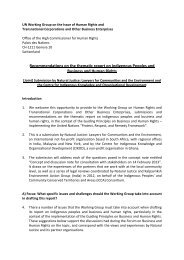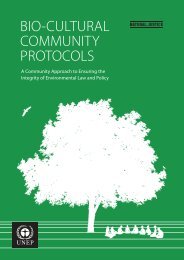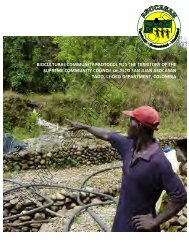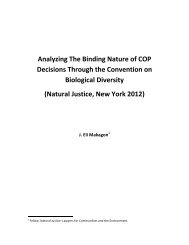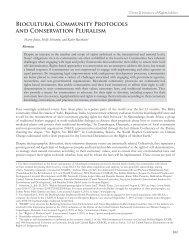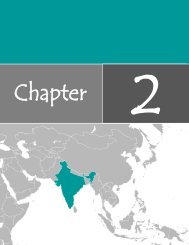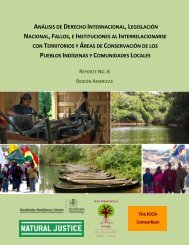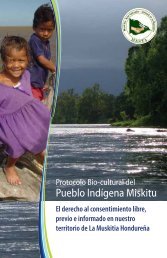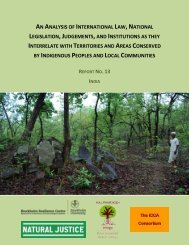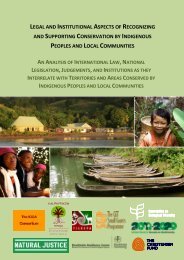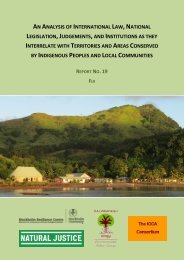Copy of bcp 18112011 English - Natural Justice
Copy of bcp 18112011 English - Natural Justice
Copy of bcp 18112011 English - Natural Justice
Create successful ePaper yourself
Turn your PDF publications into a flip-book with our unique Google optimized e-Paper software.
The biocultural community protocol <strong>of</strong> maldharis <strong>of</strong> banni193. Right to protect, regenerate or conserve or manage any community forestresource which they have been traditionally protecting and conserving forsustainable use;4. Right <strong>of</strong> access to biodiversity and community right to intellectual property andtraditional knowledge related to biodiversity and cultural diversity;5. Any other traditional right customarily enjoyed by forest dwelling, ScheduledTribes or other traditional forest dwellers, as the case may be, which are notmentioned in clauses (a) to (k) but excludes the right <strong>of</strong> hunting or trapping orextracting a part <strong>of</strong> the body <strong>of</strong> any species <strong>of</strong> wild animal;B. The Forest Conservation Act, 1980In 1955 Banni grassland was notified as a 'protected forest' under the Indian Forest Act <strong>of</strong>1927. Any use <strong>of</strong> Banni therefore for a non-forest purpose would require the permission<strong>of</strong> the Central Government under the Forest Conservation Act, 1980. Such anunderstanding was affirmed by the Supreme Court in the T.N. Godavarman case, whichstated that a non-forest activity could be undertaken on any forestland only with thepermission <strong>of</strong> the Central Government.The Government <strong>of</strong> Gujarat therefore cannot lease any part <strong>of</strong> Banni for industrial use bythe chemical companies without the consent <strong>of</strong> the Central GovernmentC. The Biological Diversity Act <strong>of</strong> 2002 and the Biological Diversity Rules <strong>of</strong> 2004The Biological Diversity Act <strong>of</strong> 2002, in its efforts to fulfil India's commitments under theConvention on Biological Diversity provides, for the conservation <strong>of</strong> biological diversity,sustainable use <strong>of</strong> its components and the fair and equitable sharing <strong>of</strong> benefits arisingfrom the use <strong>of</strong> such biological diversity and associated traditional knowledge. TheBiological Diversity Act sets up the National Biodiversity Authority (NBA) and theBiological Diversity Rules <strong>of</strong> 2004 lists the functions <strong>of</strong> the NBA as including regulatingaccess to biological resources and associated traditional knowledge for commercial andresearch purposes. The NBA is also empowered to advise the Central Government on anymatter relating to the conservation and sustainable use <strong>of</strong> biodiversity and associatedtraditional knowledge and the fair and equitable sharing <strong>of</strong> benefits arising from theutilization <strong>of</strong> biological resources and associated traditional knowledge.The Biological Diversity Act, among other things, requires the Central Government underSection 36 to promote the conservation and sustainable use <strong>of</strong> biological diversitythrough in-situ conservation and minimize the adverse effects on biological diversity <strong>of</strong>any project undertaken through environmental impact assessments that includes publicparticipation. The Central Government is tasked with ensuring respect and protection <strong>of</strong>associated traditional knowledge <strong>of</strong> local communities in accordance with therecommendations <strong>of</strong> the NBA including registration <strong>of</strong> traditional knowledge and othersui generis methods for its protection.



